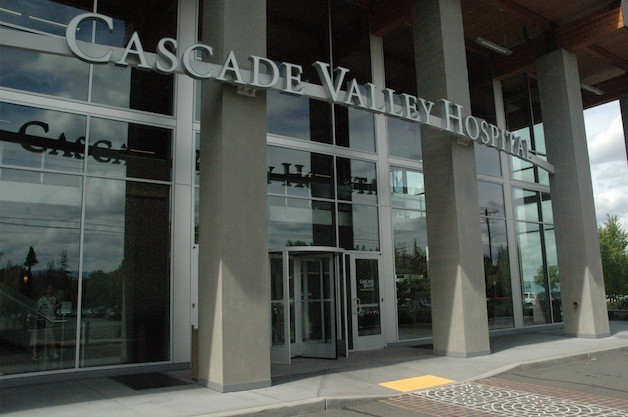ARLINGTON — The Cascade Valley Hospital and Clinics Board of Commissioners voted 5-0 on Thursday, Aug. 29, to enter into strategic alliance negotiations with PeaceHealth, which includes its proposed strategic collaboration with University of Washington Medicine, but Board Chair Dr. Tim Cavanagh wants to make sure the public understands what this arrangement actually means.
“We haven’t agreed to anything other than that we’ll enter into negotiations with them,” Cavanagh said. “Their answers satisfied us enough to think that we can work out whatever issues we might have, but there is no guarantee that we will reach an agreement.”
Cavanagh acknowledged that one of those issues will be how the Catholic-affiliated PeaceHealth will deal with reproductive issues, in light of the state Attorney General’s formally issued opinion on Wednesday, Aug. 21, that a public hospital district providing maternity care must also provide “substantially equivalent benefits, services or information” regarding contraception and abortion.
“I’ve addressed this in meetings with the CEOs and CFOs of PeaceHealth and UW Medicine,” Cavanagh said. “Everyone is aware that it’s an issue that can’t be ignored, and that whatever promises we make must be legally binding and be able to be carried out.”
Although Cascade Valley Hospital has never performed abortions before, according to Cavanagh, and is not involved in hospice, he pledged that they would abide by the law.
“We don’t want any discrimination, which we’ve never done,” said Cavanagh, who echoed earlier suggestions by Cascade Valley Hospital CEO Clark Jones that Cascade Valley Hospital under PeaceHealth might provide information or referrals for such services, rather than directly providing the services themselves, although negotiations to resolve these questions haven’t even begun yet.
Cavanagh emphasized that the process leading toward a potential affiliation with PeaceHealth and UW Medicine began three years ago, when the Cascade Valley Hospital Board began considering whether it needed to affiliate with any other health care organizations in the first place. Around about two years ago, the CVH Board decided that it did, and had partnered with two other nonprofit community hospitals — Skagit Valley Hospital in Mount Vernon, and Island Hospital in Anacortes — before those three hospital boards began considering, in turn, possible affiliations among the larger nonprofit health care systems of Providence/Swedish, Virginia Mason and PeaceHealth/UW Medicine.
“It’s been a very long process,” said Cavanagh, who echoed Jones’ arguments that independent hospitals have limited lifespans in the current economic climate, especially with the rollout of the Affordable Care Act. “The question of whom we might affiliate with has been as complex as the question of whether we needed to affiliate with anyone at all, or at what level we need to affiliate with them.”
Cavanagh explained that Cascade Valley Hospital couldn’t afford either a low-level affiliation of shared clinic services or a joint venture in which each partner would pay an equal share.
“Which leaves full integration,” Cavanagh said. “We wouldn’t be selling the district’s assets, but we’d be leaving the financial responsibilities up to them. We believe this would allow us to operate on a higher level, not just to survive, but to thrive and increase the quality and levels of our health care.”
Cavanagh reported that the CVH Board spent six months visiting PeaceHealth’s other affiliated partners and checking their records, and determined that they were the best fit for Cascade Valley. While the Skagit Valley Hospital Board also voted in favor of entering into negotiations with PeaceHealth on Aug. 29, the Island Hospital Board voted not to negotiate with any of the three larger nonprofit health care systems, and will instead continue searching for a potential partner with the aid of a community advisory board.
“We’ll do our best to keep the public informed throughout this process,” Cavanagh said. “Our main goal is to maintain health services for our community. If we don’t affiliate, we won’t survive. At the same time, none of our decisions have been made in haste.”
Nancy Steiger, CEO and CMO of PeaceHealth’s St. Joseph Medical Center, considers it an honor to have been invited into this potential partnership, and amplified one of Cavanagh’s points by asserting that elective abortions and the prescription of “Death with Dignity” medication are not commonly carried out by hospitals anyway.
“Hospitals, for the most part, are an expensive way to obtain such services,” said Steiger, who added that the law requires a patient to make two oral requests for the “Death with Dignity” medication, at least two weeks apart, before the physician can prescribe them. “And no one is sitting in the hospital for two weeks, waiting to ask again.”
Steiger proudly touted PeaceHealth’s priority on serving poor and vulnerable patients, regardless of their age, race, gender or sexual orientation, and called out the Attorney General’s lack of clarification about exactly what constitutes “substantially equivalent benefits, services or information.”
“Our lawyers are still interpreting his statement,” Steiger said. “Nobody completely understands what it means.”
One point on which Steiger is certain is that patients of the Cascade Valley and Skagit Valley hospitals will not see their services subtracted from.
“Every community we’ve come into, we’ve added services, not stopped them,” Steiger said. “Our San Juan Island Medical Center is the most recent example. We are so looking forward to starting the process of working with local leaders. It’s going to be exciting.”







